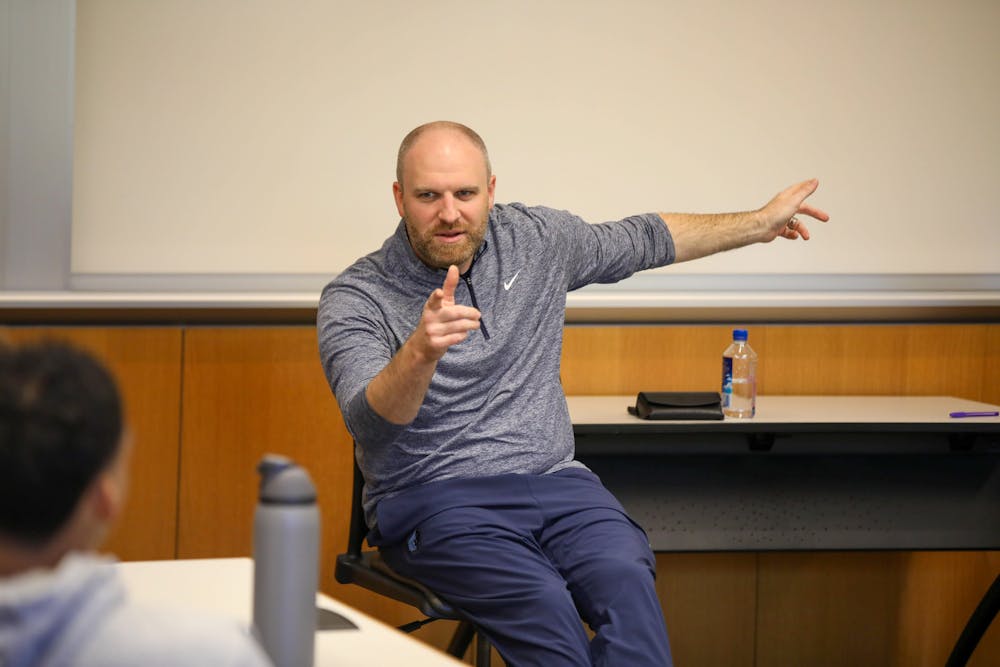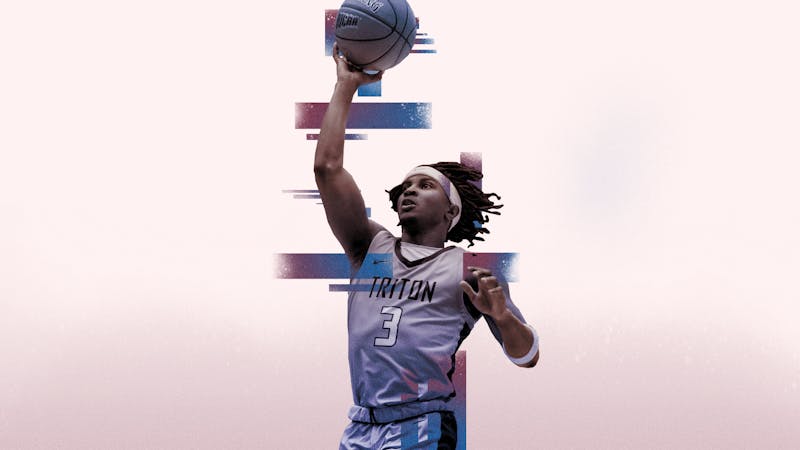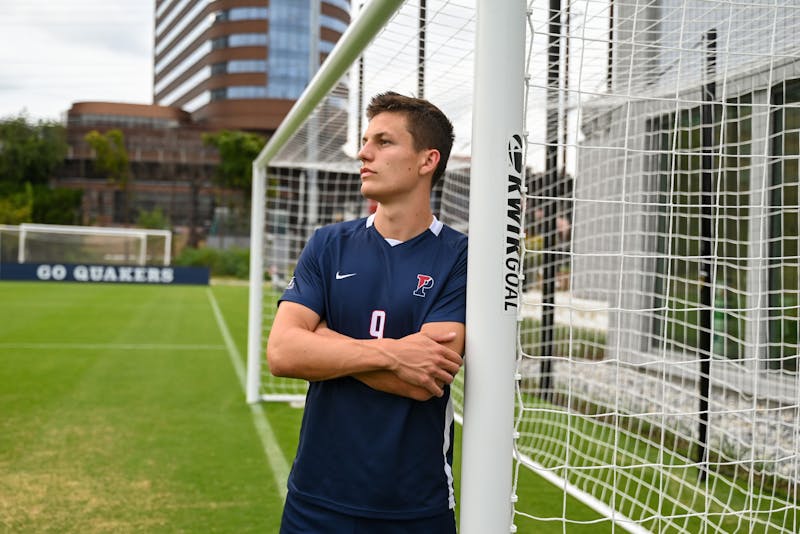
Coach Taylor Jenkins of the Memphis Grizzlies came to speak at the Wharton Undergraduate Sports Business Club Conference on Nov. 2.
Credit: Annie LiuWork to live, not live to work.
A saying that many individuals strive to achieve, this mantra has guided one individual throughout his personal and professional journey.
On Saturday, Taylor Jenkins, 2007 Wharton graduate and head coach of the Memphis Grizzlies, visited Penn to share his experience and insights going from the Ivy League to a professional basketball league. Hosted by the Wharton Undergraduate Sports Business Club, or WUSBC, the fireside chat included a moderated session, a rapid-fire question segment, and a Q&A at the end. The event was filled with lively conservation, which included Jenkins mentioning Fisher Fine Arts Library as his favorite study spot and Roman History being his favorite class during his time at Penn.
“Taylor has always been very supportive of our club. He comes every year, [he’s] super responsive, and always willing to get on a call with club members,” WUSBC president Bruno Basner said. “It really took a lot of pressure off of me knowing that he’s such a kind and welcoming person.”
The “Million Dollar Question”
How does one go from Huntsman Hall to the courtside of the NBA? Having graduated from the Wharton School with a Bachelor of Science degree in Economics concentrating in management, Jenkins didn’t follow the typical career path of many Penn alumni. Indeed, a study done by the DP in 2023 found that 50% of full-time jobs among recent Penn graduates were in the fields of finance or consulting. Despite what his peers were pursuing, Jenkins remained steadfast in his true passion – coaching.
“My buddies went on to Wall Street, and it just wasn’t something I was cut out for,” Jenkins said. “I was destined to be a teacher and coach … I wasn't going to settle for not living my passion every single day.”
The Importance of Teamwork
Although some may not see the value of a Wharton education towards what being an NBA head coach entails, Jenkins realized the importance of gaining teamwork skills during his classes. Citing Management 100 (now called Wharton 1010) as the most useful class to becoming a coach during the rapid-fire segment, Jenkins drew several similarities with the team-oriented dynamic of the NBA, such as the relationship between players, coaching staff, and the front office.
“The underlying thing that really stood out to me in my time at Wharton was how much was team-based,” Jenkins said. “Obviously, the forum here, it’s open, hopefully professors are allowing y’all to talk, and it’s interactive, and there’s debate. It's healthy for sure, but so much of our curriculum was centered around projects.”
Whenever Jenkins would analyze how he could improve the team’s dynamics, he would focus on challenging the status quo and take bits and pieces from a wide variety of outputs – things that can be attributed to analyzing case studies in his management class. Whether that meant looking at how to handle the physical toll of an 82-game season by looking at hockey teams as well as the training styles of European soccer teams, Jenkins had a knack for integrating the larger picture into his coaching philosophy.
The Unconventional Path
It is clear that Jenkins took the road less traveled by becoming an NBA head coach. But what stands out even more is that Jenkins actually did not play college basketball at the Division I level. Reminiscing on his time winning intramural basketball at Penn, Jenkins recalled taking a bet on himself — a decision that would see him coaching some of the brightest young stars in the NBA in the likes of Ja Morant and Jaren Jackson Jr. Not knowing how to work out or scout players the first go around, Jenkins highlights how that didn’t deter him from pursuing his calling.
Giving Back to His Community
Being one of 30 NBA head coaches is a dream job for many people. But to Jenkins, his dream was actualized when he led the founding of Penn West Philly Basketball League (PWBL) during his time as an undergraduate student. The program focuses on providing basketball coaching and community support for youth in the West Philadelphia area, and is currently led by Wharton sophomore Peter Hong.
In fact, Jenkins’ experience through this initiative laid the groundwork for how he got his start in the NBA. He discussed how he vividly remembered being entrusted as an assistant coach to the San Antonio Spurs’ NBA G league affiliate team because of his involvement with the local community.
A story of humility, grit, and persistence, Jenkins’ down-to-earth personality has given him perspective of the things that matter most to him in his life. This consistent approach has made him a mentor in the eyes of many individuals who look at his contributions beyond the wins and losses column.
“One of the best pieces of advice that I got from my dad was, ‘son, wake up every day being happy [with] what you do,'” Jenkins said. “There’s three things that I'm most happy about: I’m a blessed husband, I’m a blessed father of four, and I get to be a basketball coach.”
Advice for Students
To conclude the talk, Jenkins provided his last and most important piece of advice to aspiring students who may want to break into the sports industry — don’t be married to the degree. Speaking from his personal experience, Jenkins spoke about how he couldn’t shake his passion for coaching even when he had the prestige of a Wharton degree.
That being said, Jenkins recognized the frustration that can come along with the rejection that inevitably comes along with the networking process. To reconcile this, Jenkins encouraged people to stay open-minded about their career options and shoot their shot in every sports industry. Whether that is the NBA, MLB, NFL, or PGA, casting a wide net and building those relationships early to get that foot in the door is critical.
Because according to Jenkins, the best thing that stands out on your resume is not your degree; rather it’s your life experience.
The Daily Pennsylvanian is an independent, student-run newspaper. Please consider making a donation to support the coverage that shapes the University. Your generosity ensures a future of strong journalism at Penn.
Donate










